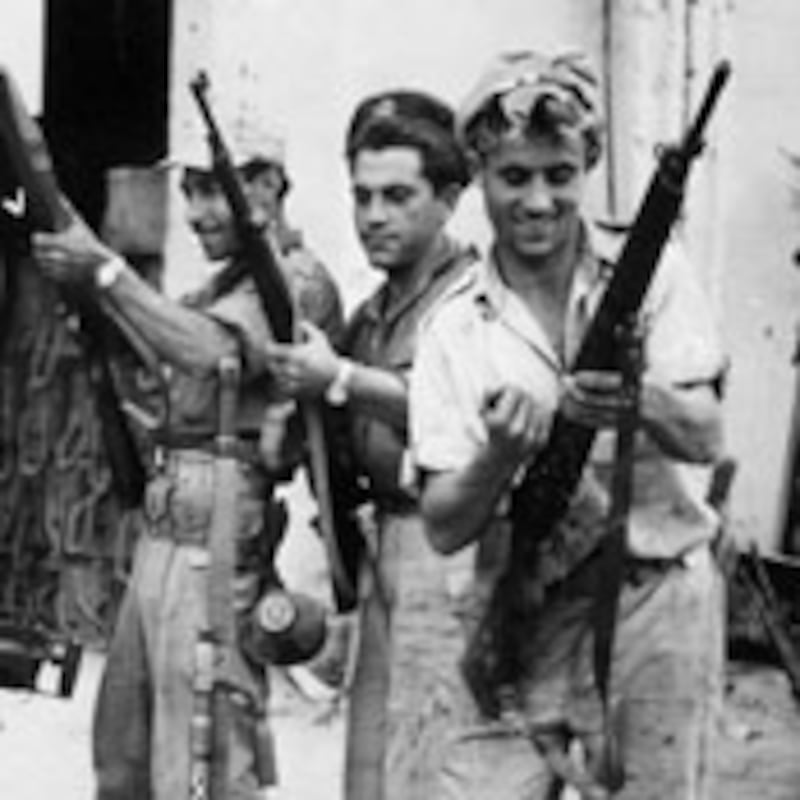
The Unspoken Alliance is a provocative book. It has ignited a firestorm in the British press and sparked angry reactions in Israel. Yet the book, which traces Israel's close and largely secret relationship with apartheid South Africa, has drawn relatively little notice in the U.S. Only a few media outlets have focused on its revelations.
The most intriguing of Israel’s far-flung security partnerships was its long and close relationship with the apartheid regime in South Africa.
At the heart of this book is a richly detailed account of how Israel and South Africa cooperated as they worked to develop nuclear weapons in the 1960s and '70s. It is especially relevant today, as nuclear rivalries escalate in the Middle East, because it explains—calmly, methodically, and with full documentation—how Israel and South Africa helped each other build atomic bombs in secret.

According to President Shimon Peres, however, the book slanders Israel. Peres took special umbrage at author Sasha Polakow-Suransky's assertion that when Peres was defense minister in 1975, he was involved in offering to sell South Africa advanced Jericho missiles, which could be equipped to carry nuclear warheads. In a letter to The Guardian, which reported the allegation, Peres said it had "no basis in reality" and was the result of "selective interpretation of South African documents." Replying in Haaretz soon afterward, Polakow-Suransky called Peres' letter evasive.
"The 1975 deal was never consummated," he wrote, "but there is no doubt Peres took part in the discussions and that the South Africans perceived Israel's proposal as a nuclear offer."
Israel has been an exporter of military power for most of its existence. During the Cold War, usually acting with at least tacit approval from Washington, Israel served as unofficial quartermaster to pro-Western regimes around the world. Arms exports became a foundation of the Israeli economy and helped the country win a remarkable array of friends.
During the 1980s, Israel was the chief supplier to the Guatemalan army, trained anti-terror squads in Honduras, and sent hundreds of tons of weaponry to the Nicaraguan Contras. Israelis established private security forces in Colombia that ranchers used to protect themselves and dispatch their enemies, and did the same in the Philippines during the Ferdinand Marcos era. Dictators from Chile to Indonesia equipped their armies with Israeli-made Galil assault rifles and Uzi submachine guns. Israeli advisers trained anti-Marxist rebels in Angola and Libyans fighting Muammar Qaddaffi’s regime.
The most intriguing of Israel's far-flung security partnerships was its long and close relationship with the apartheid regime in South Africa.
The book opens with what was surely the most jarring public moment in the history of this odd relationship. In 1976, Prime Minister John Vorster of South Africa, who the British had jailed during World War II for his pro-Nazi activities, was given a red-carpet welcome in Israel, laid a wreath at the Yad Vashem Holocaust memorial, and heard Prime Minister Yitzhak Rabin praise him at a state banquet for creating a “prosperous atmosphere of cooperation” between their two countries.
Israelis were conflicted about their relationship with the Pretoria regime. Early leaders, notably David Ben-Gurion and Golda Meir, were outspoken critics of apartheid. Gradually, however, as the center of gravity in Israeli politics shifted, Israeli leaders came to see South Africa as a kindred state, besieged by an angry ethnic enemy and unfairly stigmatized by a hypocritical world. Blacks in South Africa “want to gain control over the white minority just like the Arabs here want to gain control over us,” reasoned one Israeli chief of staff, General Raful Eitan. “And we, like the white minority in South Africa, must act to prevent them from taking over.”
According to The Unspoken Alliance, the Israel-South Africa relationship began to blossom in the 1960s and became rich and multi-layered during the 1970s. Israelis trained South Africa’s elite military units, sold tanks and aviation technology to its army, and licensed the production of Galil rifles at a factory in South Africa. What made this relationship unique, though, was that both countries were pursuing nuclear weapons.
They made a simple deal: raw materials for technology. South Africa mined uranium, and sent 500 tons of yellowcake to Israel from the mid-1960s to the mid-1970s. In return, Israel shared its ballistic-missile technology and sent South Africa 30 grams of tritium, which Polakow-Suransky describes as “a radioactive substance that thermonuclear weapons require to increase their explosive power. Thirty grams was enough to boost the yield of several atomic bombs.”
With each other's help, Israel and South Africa succeeded in producing nuclear weapons. The United States was not a party to their conspiracy, and in fact sought at several points to monitor and restrict it. American nonproliferation efforts, however, were not vigorous enough to penetrate an operation that both sides worked assiduously to hide. “Secrecy about the extent of their ties was paramount,” Polakow-Suransky writes. “Disguise and denial became the norm.”
This account of the two countries' parallel nuclear programs has attracted considerable attention for The Unspoken Alliance in the Israeli press. The author has been widely quoted there, and has made the rounds of public-affairs interview appearances in Washington, San Francisco, and elsewhere. Curiously, though, no bookstore or local media outlet in New York, where he lives, has yet given him a forum.
Israel remains a nuclear power, albeit undeclared, and since details of its programs are secret, it is naturally eager to keep them hidden. South Africa dismantled its arsenal in the early 1990s. Prime Minister F.W. de Klerk's announcement in 1993 that the job had been completed was the first official confirmation that South Africa had in fact possessed nuclear weapons. It constituted what Polakow-Suransky calls “the world's first case of voluntary disarmament.” The motivation was compelling: De Klerk and his white caste were not about to bequeath a nuclear arsenal to the African National Congress.
During the 1960s, Israel courted African governments, but its cooperation with apartheid South Africa ultimately poisoned many of those relationships. “The people of South Africa will never forget the support of the state of Israel to the apartheid regime,” Nelson Mandela said soon after being released from prison. And Polakow-Suransky reminds us that in 1981, the 19-year-old Barack Obama centered his first public speech on a demand that his school, Occidental College, divest from South Africa.
Polakow-Suransky concludes his book with two maps, one showing the isolated South African “homelands” into which the apartheid regime herded many blacks, and the other showing Israeli settlements on the West Bank. He quotes former Israeli Prime Minister Ehud Olmert as warning that his country could one day “face a South African-style struggle for equal voting rights, and as soon as that happens, the state of Israel is finished.”
In an interview, Polakow-Suransky said the clandestine cooperation that propelled Israel and South Africa into the nuclear club is an instructive model for today's proliferators. “Aspiring nuclear powers like Iran probably study the South African case from the '70s very closely, and also Israel's case from the '60s, in terms of deceptively developing a nuclear capacity,” he said. “Both are models of covert development with denialist rhetoric on the surface. Both countries faced the threat of sanctions, yet both managed to complete their programs.”
Can sanctions slow a country's drive for nuclear weapons? Only at early stages of the program, Polakow-Suransky said. “In the South African case, all of the pressure and total isolation of the late 1970s pushed them further toward full proliferation,” he asserted. “Any aspiring nuclear power close to the finish line will do anything necessary to get across. Israel did that, and so did South Africa. Whether Iran gets there or not, it's probably trying to do that now.”
Plus: Check out Book Beast, for more news on hot titles and authors and excerpts from the latest books.
Stephen Kinzer is an award-winning foreign correspondent. His new book is Reset: Iran, Turkey and America's Future.






